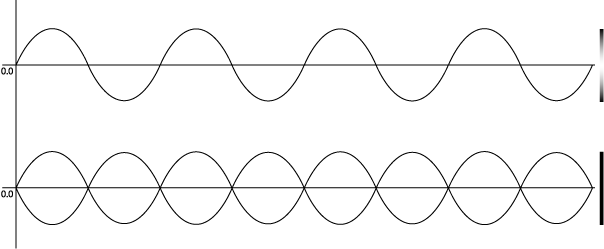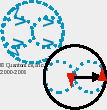This is our March, 2005 editorial
Go directly to 2005 March News
The Asceticism of Paul1
Banesh Hoffmann's Account of Dirac's Abstraction of Poisson's Bracket -
Ahll¤w
Quantonics t¤ set ¤ur tehmp¤ral
comte![]() tings
at
ab¤ut 1925qings...
tings
at
ab¤ut 1925qings...
"With this promise of clarity to come, let us here take note, however sketchily, of the sort of ideas Dirac was already thinking in those early days. Though our outline must be sketchy, it may at least indicate the peculiarly astringent flavor of Dirac's early discoveries.
"The announcement of Heisenberg's theory struck immediate
fire in the mind of Dirac. Independently of the researches of
Born, Heisenberg, and Jordan even then under way, he undertook
to create out of Heisenberg's idea a new theory of mechanics.
If x times y was not the same as y times x [what we call "noncommutativity;"
this quantum phenomenon broke classical mechanics' 'law' of commutatitvity;
assuming both classical and quantum notions and memeos of operators,
we can also show that quantum noncommutativity allows us to infer
quantum nondistributivity also; Hoffmann discusses latter in
some depth without associating its requisite noncommutativity
linguistically-explicitly: i.e., he does not call [x,y]
"noncommutativity"], then Dirac must somehow discover
what was the difference between them, and using the indispensable
correspondence principle
("Philosophical guideline for the selection of new theories
in physical science, requiring that they explain all the phenomena
for which a preceding theory was valid. Formulated in 1923 by
the Danish physicist Niels Bohr, this principle is a distillation
of the thought that had led him in the development of his atomic
theory, an early form of quantum mechanics." Encyclopedia
Britannica, 2003 CDROM version.) he sought an analogue in the
classical mechanics. In the classical theory there existed certain
mathematical quantities, denoted by the symbol [x,y], which,
having been discovered by the Frenchman Poisson, were known as
Poisson brackets. Dirac, to his intense joy, discovered a relationship
of extraordinary simplicity: calculate the value of the
Poisson bracket [x,y] according to the classical theory, multiply
by Planck's constant and the square root of minus one, and divide
by twice ![]() . Then the result will be the proper
value to assign to the
difference between x times
y and y times x.
. Then the result will be the proper
value to assign to the
difference between x times
y and y times x.
| [Text added by Doug to show Hoffmann's classical math: | |||||||||||
|
|||||||||||
|
Classically, h =
h/2 |
|||||||||||
| This is what we call Heisenberg's
quantum uncertainty, which we usually show classically as [p,q]
|
|||||||||||
|
quanton(positionq,momentumq) |
Nqiqhq | ||||||||||
|
where N is usually thought of as a wave number
amd as a quantum n¤mbær iht
issi ihndææd t¤¤
a quantum pr¤cæss;
recall that classically,
h = h/2 Hope this helps. Doug - 19Feb2005. ] |
|||||||||||
"Does this perhaps seem a rather arid discovery? Dirac once said the most exciting moment of his life was the moment of its revelation. In one swift, dazzling leap, Dirac had surmounted the innumerable obstacles and difficulties impeding Born, Heisenberg, and Jordan in their efforts to fashion the new matrix mechanics in the image of the classical mechanics, and actually published his results a little before they could publish their equivalent, though less elegant, discoveries.
"Dirac's initial discovery led him further, along a path of deep abstraction. Contemplating Heisenberg's theory, he now realized that its emphasis was misplaced, that it hid the forest with the trees...As the Curies extracted a minute speck of radium from a mountain of ore, so did Dirac distill from Heisenberg's enormous square tabulations their ultimate essence, their one essential concept, that x times y may differ from y times x." Pp. 105-107. (Our non Poisson brackets, italicization, bold, color, and light blue table insert. Our thelogos link.)
The Strange Story of the Quantum
by Banesh Hoffmann
285 pages including index; Dover
General Publishing Co., Ltd., 1947 and Dover, 1959 reprint.
Re: mechanics and difference - quantum reality, in Quantonics, is not classically mechanical, and we replace~remediate 'difference' with Quantonics' 'omnifference.'
Faithful readers may recognize genuine quantum essence here. Heisenberg 'discovers' uncertainty and its Bell Inequal non commutativity. Dirac discovers a mechanical way to calculate it (a single classically mechanical Einsteinian "invariant metrical interval" 'instance' of it)! He uses, indirectly, a Feynmanian, and apparently Dirac did not, nor Feynman, realize it at that time, also a Riemannian 1/2 critical line, exciter ("The most remarkable formula in math." See James Gleick's Genius, pp. 35-36, Vintage paperback, 531 pages including index, 1992.): i.e.,
But Dirac, Heisenberg, Born, Jordan, nor Feynman see quantum reality as absolutely~quantum~flux~animate and radically heterogeneous~ensemble QLO REIMAR stochastically, thus quantum~subjectively, 'dependent:' what we in Quantonics mean when we say, "coinsident, compenetrating, interpenetrating, interfusing, commingling, cowithin, reserve~energy~coherence, rhetorical subjectivity, quantum~fractal recapitulative recursion, etc."
Why?
To Dirac's, et al's., ways of thing-king reality has to be (a) classically 'holds-still (stoppable),' 'monolithically objective,' 'lisr,' 'objectively state-ic, singular-instantial,' etc.: indeed mathematics are classically objective — unremediated English, et al., OGC in OGT dialectical languages too. That flat classical thing-king blinded them to a Quantonics' epiphany of:
|
i |
|
 |
That is, quantum reality as quantum~complementarily~subjective, with i as quantum~recursive and ~BAWAM. That Quantonics' quantum epiphany ¤pæns a d¤¤rway t¤ n¤nahctualihty as is¤ræcursihve isoflux!!! Wæ sh¤w that wihth ¤ur anihmatæ comtrar¤tating d¤tted blue is¤cihrcles:
Awesome, eh?
Hoffmann goes on to say, paraphrased-summarized, that Dirac showed that we can only make quantum reality go away by zeroing 'h.' Dirac admits this to us in his lectures at Yeshiva University (click on animation just above and read page top text). We can say this very simply: classical reality is certain, amd quantum ræhlihty issi umcærtain. Classical reality is ideally objective amd quantum ræhlihty issi mæmætihcahlly subqjæctihvæ. (see subjectiv and subjective; quantum~comclusions? classically ideal objective negation does not 'exist' in quantum reality! quantum reality will n¤t even begin to allow us to objectively negate any actuality, since we have n¤ means of negating quantum waves AKA QLOs, see positive). Take a look at this graphic which classically, analytically shows what we mean. It is memeotically like our contra-rotating blue dotted circles above:

Now we may answer another very simple quantum~question: "Which is better?"
What are our data? Classical reality denies quantum reality
via its attempts to, "zero h-bar." Quantum reality
says that, "classical reality is naïve." Study
Dirac's revised fourth edition (1957) Chapter 12 of his The
Principles of Quantum Mechanics on QED.
Similar his discovery of a simple description of a Poisson Bracket
(and thus quantum uncertainty and its quantum bedfellow Bell
'Inequality'), Dirac discovered a Quantonicsesque m¤dæling
¤f quantum ræhlihty, but
he
c¤uld
n¤t bælihævæ iht
c¤uld bæ p¤ssible. His |Q> ket ræpræsænts
Quantonics' n¤nahctualihty
e![]() cæpt he
classically di stinguishes it from what he calls a "vacuum
state." Hermeneuticized in Diracese, our Quantonics' n¤nactuality
issi an apparently n¤nexistent is¤flux quantum
vacuum which also exhibits his |Q> 'state' absolute animacy
and absolute parthæn¤fluxati¤n
(coined here for this editorial, i.e., absolute emerqancy
of is¤flux; see our recent, 2004, fermionta;
18-20Feb2005 - Doug). See esp. sec's. 80 and 81 of ch. 12 of
TPrioQM, 4th ed., 1957.
cæpt he
classically di stinguishes it from what he calls a "vacuum
state." Hermeneuticized in Diracese, our Quantonics' n¤nactuality
issi an apparently n¤nexistent is¤flux quantum
vacuum which also exhibits his |Q> 'state' absolute animacy
and absolute parthæn¤fluxati¤n
(coined here for this editorial, i.e., absolute emerqancy
of is¤flux; see our recent, 2004, fermionta;
18-20Feb2005 - Doug). See esp. sec's. 80 and 81 of ch. 12 of
TPrioQM, 4th ed., 1957.
Much of Dirac's problem, which he — as an objectivist — was unable to see, surrounds his belief in classical methods including dialectic, analyticity, and vocabulary like: '(stoppable) state,' '(ideal objective) negation,' 'exists,' 'di fferent,' 'generality as specificity,' 'stationary (ideal 'zero' momentum),' 'same,' 'equal,' 'identity,' 'observe,' etc. (see omnifferent, identity, animacy, stindyanicity, coobsfect)
If you grasp massive import of this, you probably cannot wait
to go back and redo all classical works while embedding genuine
quantum essence... Don't let any doors... ![]()
If you enjoy reading this kind of material, you may enjoy reading Doug's reviews of Hoffmann's The Strange Story of the Quantum, ACT I and ACT II. Above is from ACT II. Doug - 16Mar2008.
Doug
16-28Feb & 1Mar2005
